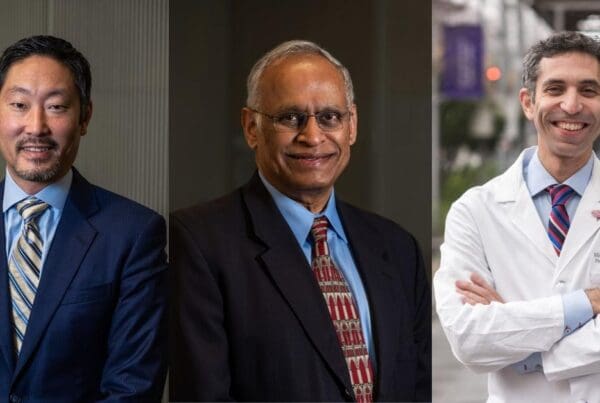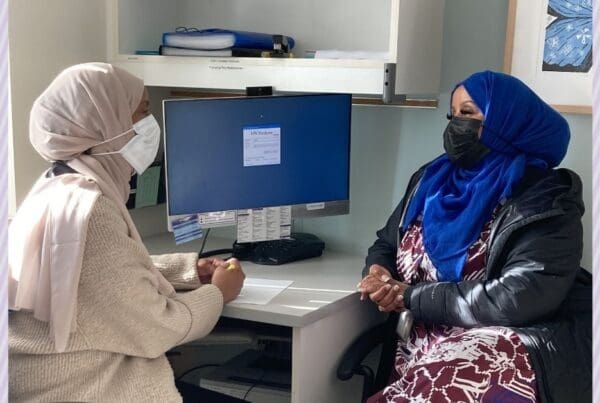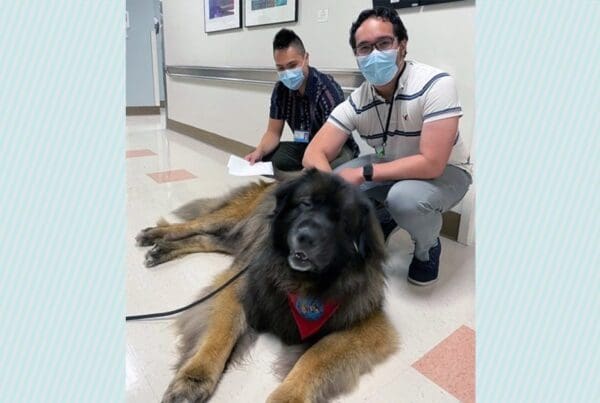Caption: Tim Dellit (left) and Thuan Ong (right) take a moment to acknowledge the significance of the first COVID-19 vaccines administered at UW Medicine.
Highlights | COVID-19 vaccines are here
- An initial 3,900 doses of the Pfizer-BioNTech vaccine were delivered to UW Medicine on Dec. 14.
- Front-line healthcare workers were the first to receive the COVID-19 vaccine in Seattle on Dec. 15.
- Now, more than 85,000 doses of the vaccine have been administered to employees and community members.
- Learn more about COVID-19 vaccination priority groupings for UW Medicine employees.
This story contains images of needles used to administer the COVID-19 vaccine.
Dec. 15 was a historic and hopeful day at UW Medicine. Thirteen front-line healthcare workers, including a Seattle Fire Department paramedic, were the first to receive the COVID-19 vaccine in Seattle.
Now, 85,000 doses (and counting) have been administered — and that sense of hope carries on as we continue to vaccinate more in our community.
First dose of hope
Let’s take a look back at the first people in Seattle to receive the COVID-19 vaccine.
Amy Fry, Nurse, COVID-19 ICU, Harborview Medical Center
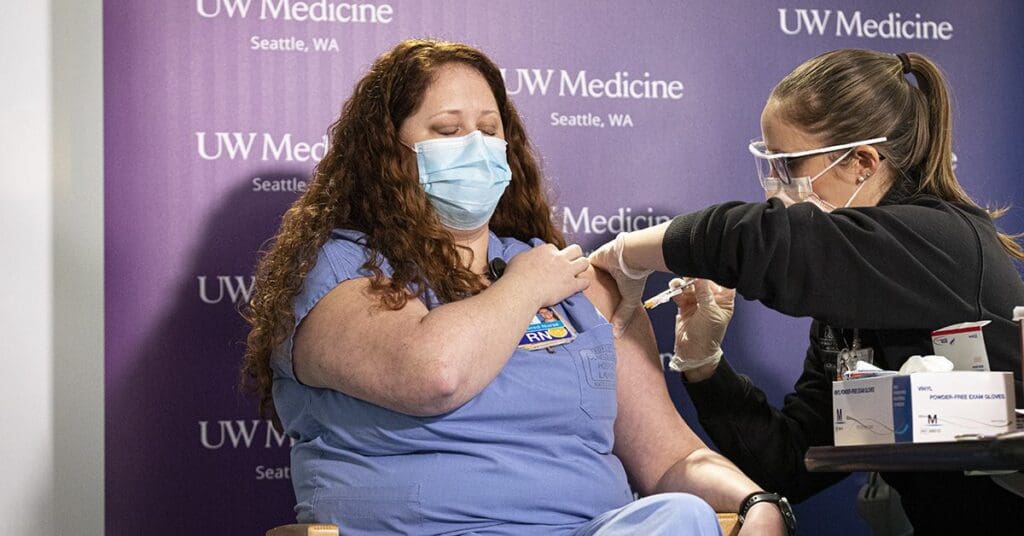
Amy Fry (left) receiving the first dose of the COVID-19 vaccine in Seattle administered by Allison Miller (right).
“I feel excited, and for the first time in a while I feel hope. It has been a long exhausting road.”
Emily Agudo, Nurse, Emergency Department, UW Medical Center – Northwest
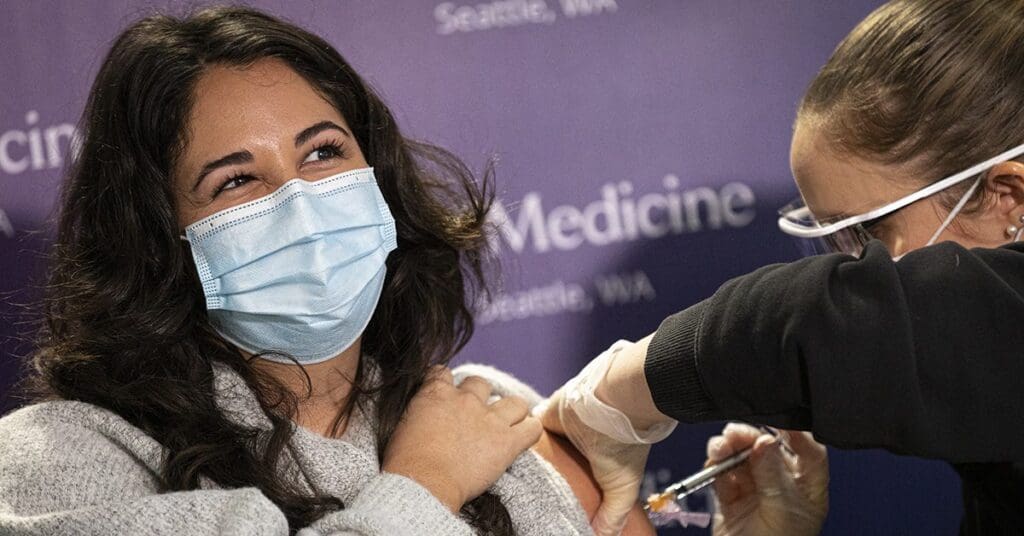
Emily Agudo (left) receiving the COVID-19 vaccine administered by Allison Miller (right).
“There is fear coming home to your family and worrying about them. This is a big sense of relief.”
Shahina Banthanavasi, MD, Medical Director, Hospitalist Team, Valley Medical Center
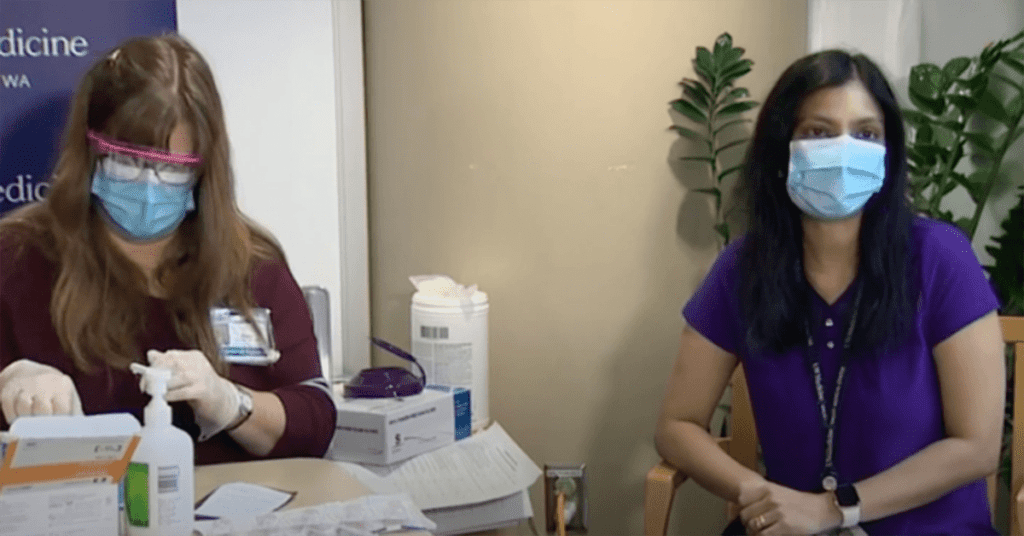
Shahina Banthanavasi (right) waiting to receive her COVID-19 vaccine administered by Jane McNulty (left).
“I think we have all been dreaming of this day, and I am excited to be here and be part of this.”
Joseph Gipson, Environmental Services, UW Medical Center – Montlake
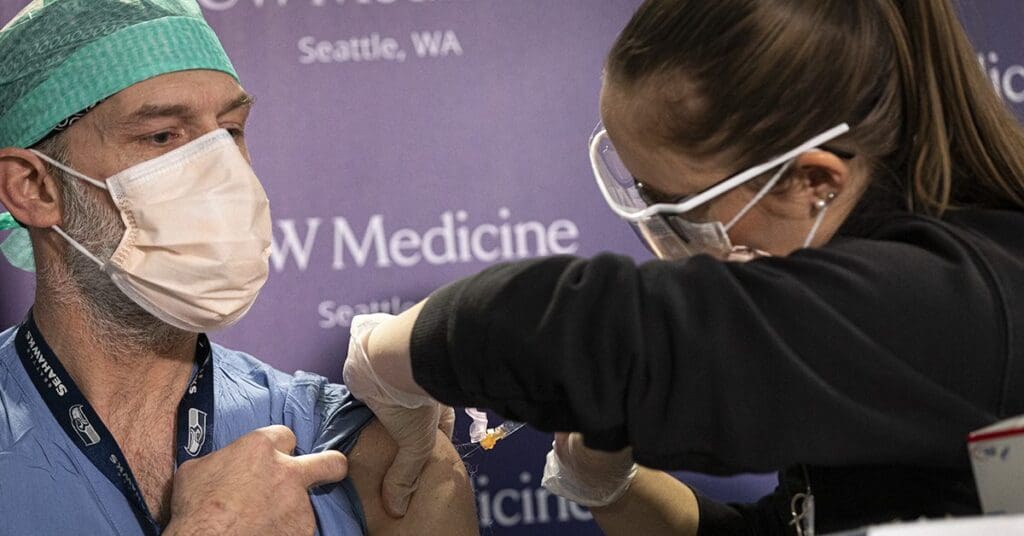
Joseph Gipson (left) receives the COVID-19 vaccine administered by Allison Miller (right).
“This is a light at the end of the tunnel but we still need to keep the faith, press on, take care of the ones around us — co-workers and family — and keep the social distance going.”
Alan Goto, Paramedic, Seattle Fire Department Medic One
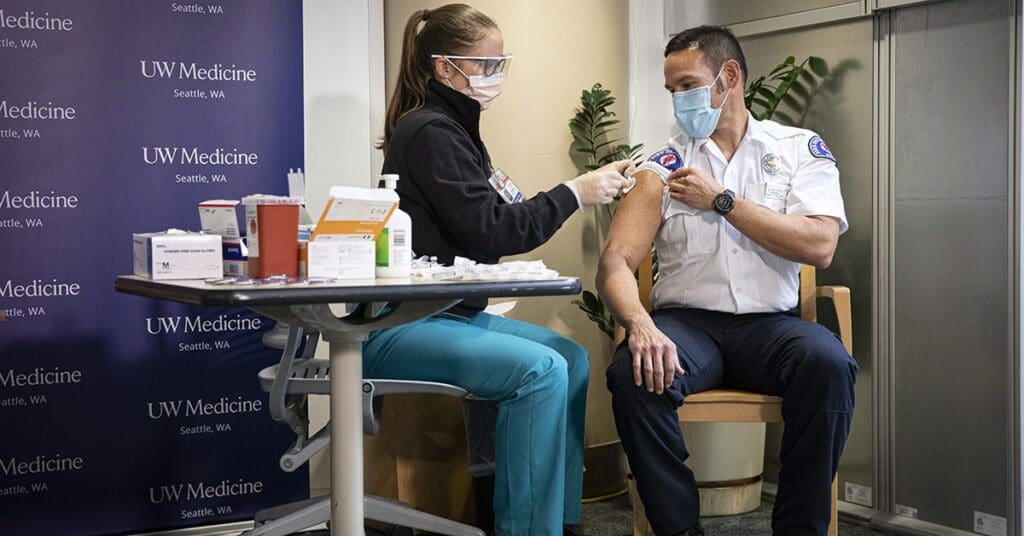
Allison Miller (left) prepping Alan Goto (right) for vaccination.
“For paramedics and firefighters to be vaccinated, it’s going to help us do our job safer and more efficiently — but it’s also our responsibility as part of this community to do this.”
Mikaela Hagberg, Flight Nurse, Airlift Northwest
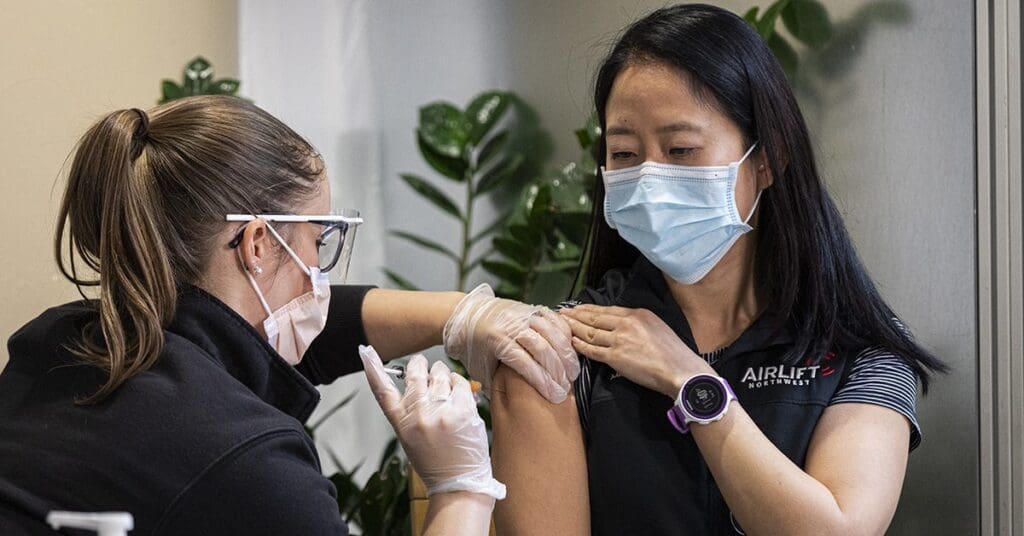
Mikaela Hagberg (right) receiving the COVID-19 vaccine administered by Allison Miller (left).
“We are really lucky to be part of the UW Medicine system that advocates for us to have this vaccination and provide it to everyone. Hopefully this will be a step toward the end of the pandemic — we have all been working hard and it’s hard to keep the motivation when there is no end in sight.”
Patricia Kritek, MD, Pulmonary/Critical Care and Sleep Medicine, UW Medical Center – Montlake
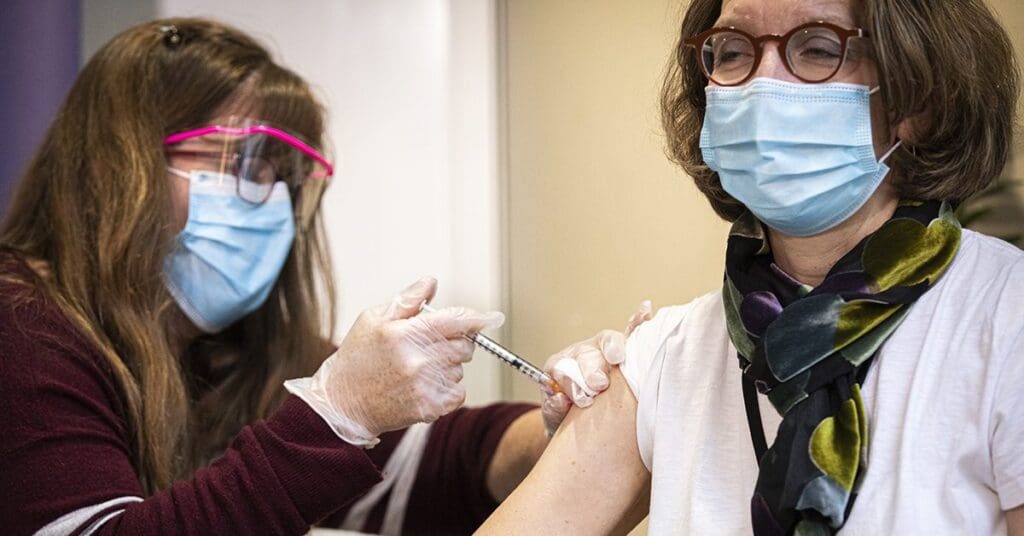
Patricia Kritek (right) receiving the COVID-19 vaccine administered by Jane McNulty (left).
“I think it’s really powerful and an incredible moment for all of the folks that are here today, but really more importantly for our community. This is how we are going to take care of each other.”
Annika Lucich, Nurse, COVID-19 Acute Care, UW Medical Center – Montlake
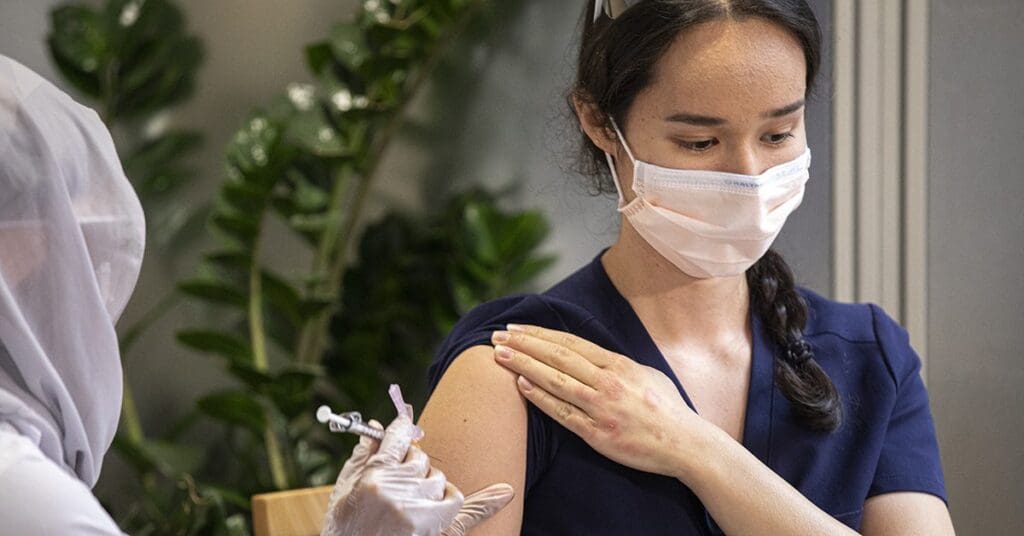
Annika Luchich (right) receiving the COVID-19 vaccine administered by Fetiya Omer (left).
“This is a big relief for everyone I work with and it means a lot to me.”
Jules Mack, Clinical Specialist, Respiratory Care, Harborview Medical Center
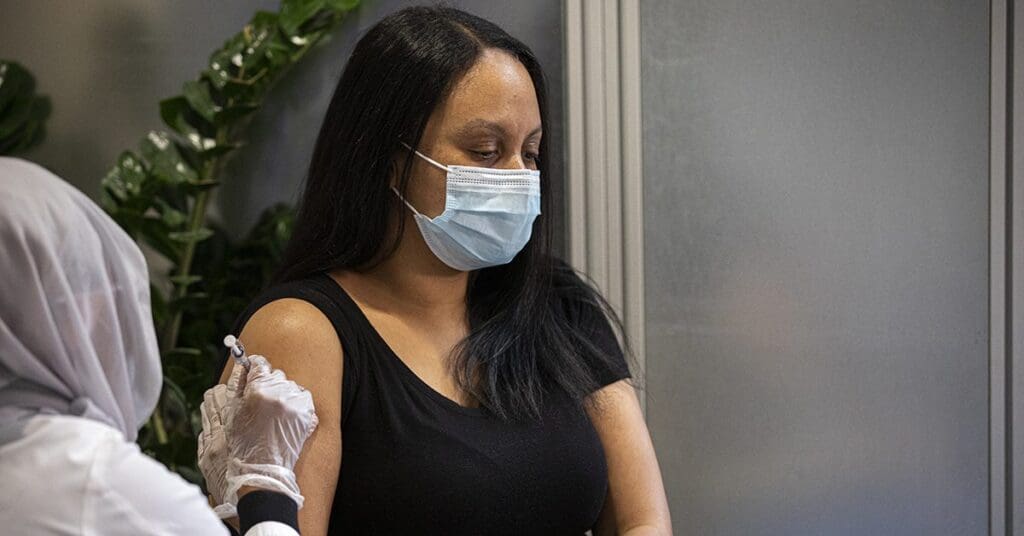
Jules Mack (right) receiving the COVID-19 vaccine administered by Fetiya Omer (left).
“When I am at the hospital I feel like I am protected by our infectious control, PPE procedure, but the second layer of protection from the vaccine will give me a lot more confidence when I am out in the community.”
Emily Martin, MD, Emergency Medicine, Third-Year Resident
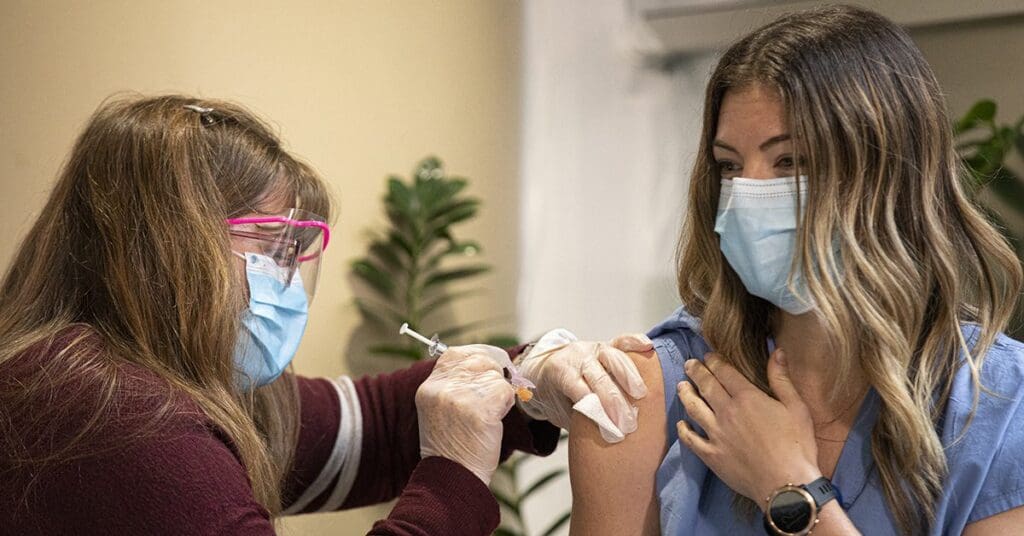
Emily Martin (right) receiving the COVID-19 vaccine administered by Jane McNulty (left).
“It’s been an interesting time to be in training. I think as residents we will all remember this as an incredible time to be a part of medicine — but it has also been extremely hard.”
Thuan Ong, MD, Director, Post-Acute Care Network, Harborview Medical Center
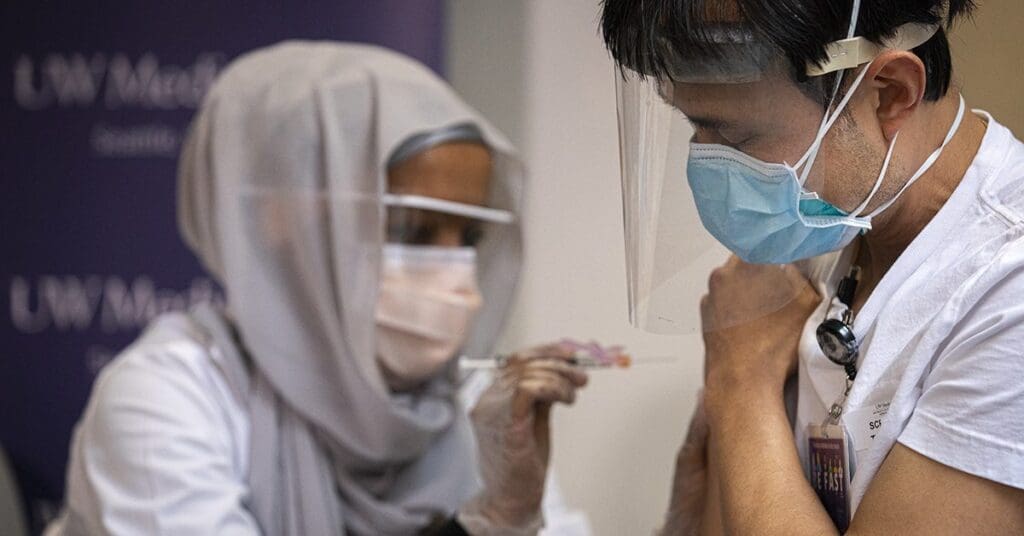
Thuan Ong (right) receives the COVID-19 vaccine administered by Fetiya Omer (left).
“I feel so privileged and honored to be vaccinated today but my heart goes out to staff and residents in long-term health care facilities.”
Myo Thant, Patient Care Technician, UW Medical Center – Montlake
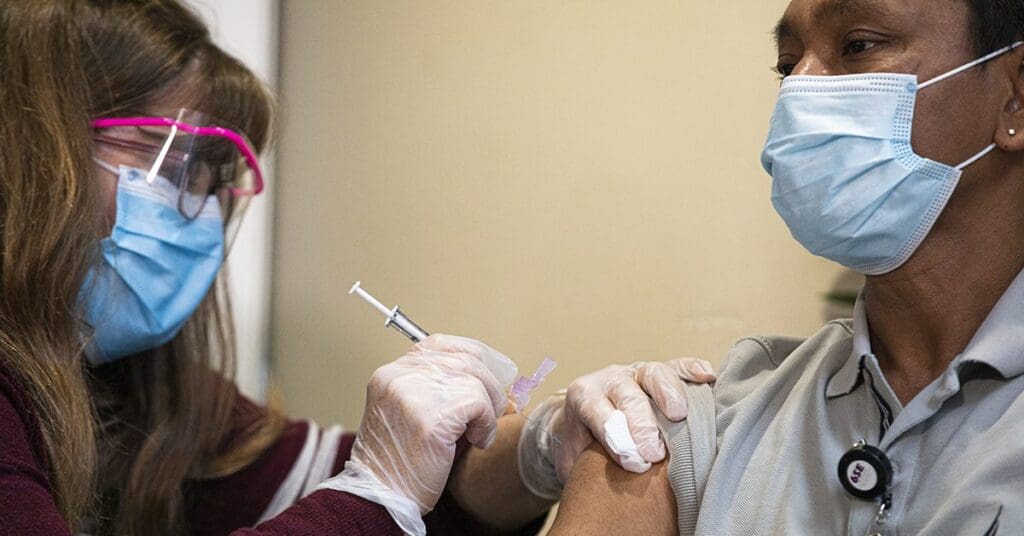
Myo Thant (right) about to receive the COVID-19 vaccine administered by Jane McNulty (left).
“I would encourage my family and my friends — we need it, this vaccine, this is our hopes and dreams coming to reality.”
Second dose brings hope and hard reflection
Thuan Ong, MD, MPH, specializes in geriatric medicine and post-acute care. He has been working with multidisciplinary support teams to help improve outcomes and provide testing at local long-term care facilities over the course of the pandemic.
As one of the first 13 in Seattle to get the vaccine, he has received his second shot and is now fully vaccinated.
For Ong and many others in healthcare, receiving the COVID-19 vaccine welcomes in hope for the future with a wave of hard reflection.
“I and many of our post-acute care clinicians felt very conflicted,” says Ong.
Early on in the pandemic, most local post-acute care and skilled nursing facilities lacked access to and adequate supplies of personal protective equipment (PPE). Ong and other acute care employees had access to PPE through the support of UW Medicine and would enter into nursing homes fully donned.
“Often we were asked by skilled nursing staff where we were able to obtain PPE and if we could share,” says Ong. “It broke our hearts when we could not.”
Ong says he felt a great sense of privilege and gratitude to have PPE resources that allowed him to care for high-risk patients, but heartbroken that not all care providers were afforded the same.
This same feeling extended to the COVID-19 vaccine.
“I feel incredibly grateful and privileged to be one of the first groups of clinicians to be vaccinated, but also a sense of sorrow, because we have colleagues, family and friends who had to wait in a situation where cases and hospitalizations were climbing,” says Ong.
“This year has been hard for all of us,” he says. “But I remain hopeful that through people’s pure determination, we will get beyond this.”
Show your support for the COVID-19 vaccination efforts
Show your support for the COVID-19 vaccination efforts by using a UW Medicine COVID-19 vaccine Zoom background. Follow these steps to update your Zoom background.
Watch the video
Employees reflect on this challenging year in healthcare and their hopes and expectations for the future.
Video by UW Medicine Newsroom
More information on vaccines for employees
- Frequently Asked Questions About COVID-19 Vaccines for Employees
- COVID-19 Vaccination Priority Groupings for UW Medicine Employees
Media event photos courtesy of Mark Stone, University of Washington.
